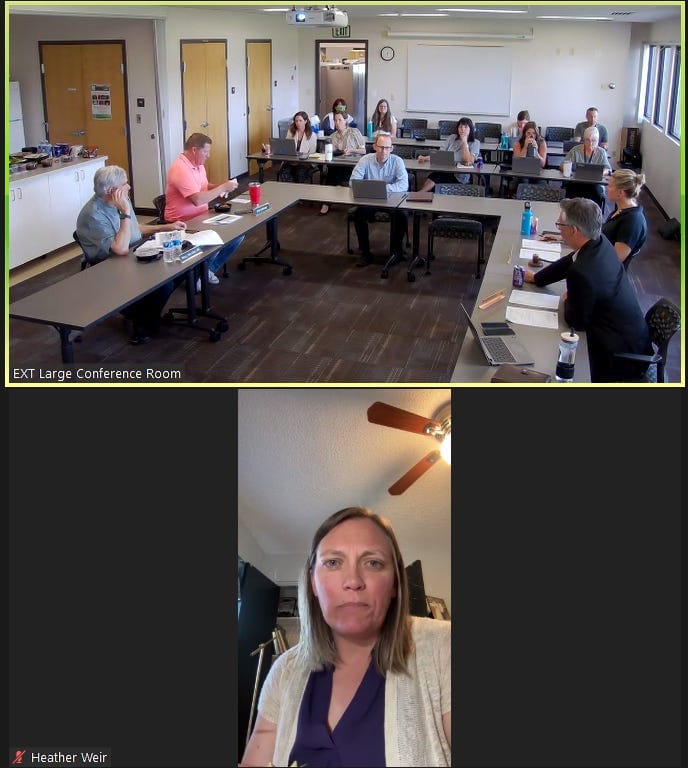Larimer County Board of Health Meeting 6/20/24
by Shannon Murphy
For more information (including members in attendance) see the full notes document here.*
View the meeting agenda and packet.
From the Board of Health Website: The Larimer County Board of Health (BOH) is composed of five volunteer Larimer County residents who are appointed by the Larimer County Board of County Commissioners to serve five-year, staggered terms. The Larimer County Board of Health is the governing body for the Larimer County Department of Health and Environment (LCDHE). The Board of Health is responsible for approving the local five-year community health improvement plan, providing advice to the Public Health Director, assessing fees to offset costs for environmental health services, adopting environmental health rules, and approving LCDHE's budget.
Following the Call to Order by Christy Bush, the Board unanimously approved the May 16, 2024 minutes (see agenda packet).
2025 Budget Considerations: A representative from the Larimer County Budget Team presented on the 2025 budget update (see packet), including an overview of the budget process, budget targets, new and potential property tax laws, and general fund forecast. The presenter highlighted the following points:
- The county uses incremental budgeting -- meaning the budget is prepared by taking the current period's budget or actual performance plus inflation as a base, with incremental amounts then being added for the new budget period.
- This summer, staff is holding work sessions on compensation changes and conducting public outreach via surveys and community conversations. In the fall, the County Manager will meet with the 27 offices and departments, then submit the proposed 2025 budget by October 15.
- In May, Colorado lawmakers passed an overhaul of the state’s property tax code; however SB-233 will not take effect if either Initiative 50 or 108 is approved by voters in November. SB-233 reduces assessment rates; caps annual property tax revenue growth at 5.5% (with some exceptions) unless local voters approve excess; and decouples assessment rates into school districts and non-school districts.
- Colorado voters will vote on two ballot measures in November. Initiative 50, also known as the Colorado Property Tax Revenue Cap Initiative, would institute a constitutional 4% annual cap on statewide property tax revenues and force a statewide vote for any local district that wishes to keep revenues above that cap limit. Initiative 108 would cut property tax assessment rates and require the state to reimburse local governments for the lost revenue.
- The representative forecasted that SB24-233 and Initiative 50 could reduce the general fund reserves. As a result, the Budget Office has asked every department to prepare program inventory, indicating which services are mandated by the state and which are discretionary in order to identify potential adjustments and cost savings. The representative said, for example, making changes that increase the DMV wait time from 10 minutes to 2 hours would be a discretionary service adjustment.
- In terms of 2025 revenue projections, property taxes, intergovernmental revenue, and charges for services, licenses, and permits are expected to rise. For 2025 expense projections, personnel and operating costs are expected to rise.
Director’s Update: The agenda packet includes a detailed report of the director’s update. During the meeting, Tom Gonzales invited representatives to share about the following department activities:
- LCDHE’s Youth Engagement Specialists created a campaign to better educate peers about fentanyl and drug overdose prevention. They entered their proposal, Fentanyl F*%#ing Kills, in the Substance Abuse and Mental Health Services Administration (SAMHSA) FentAlert Challenge. They received one of the Honorable Mentions among nearly 200 entries from across the country and are using their $2,000 winnings to produce a short film to go along with the campaign.
- After 2023 was a record-breaking year for mosquitoes in Larimer County, the Enhanced Mosquito Surveillance Project -- a collaborative project among the Town of Berthoud, CDC, Vector Disease Control International, CSU Lab, and LCDHE -- seeks to increase the number of mosquito traps in Berthoud to better understand the risks of West Nile Virus, said a LCDHE Communicable Disease representative.
- Kori Wilford and Erika Cathey were selected for the year-long Advanced Leadership Training Program offered by the Regional Institute for Health and Environmental Leadership (RIHEL), offering an opportunity to explore leadership styles with a diverse, interdisciplinary network of leaders dedicated to public health.
- CSU Extension is researching the interconnectedness of mental health and cardiometabolic health concerns with two community-based projects:
- 1) Learning to BREATHE - an adolescent adaptation of mindfulness-based stress reduction that has shown to reduce depression symptoms, improve mindfulness and emotion regulation, and potential benefits for health-related outcomes like eating behavior and indicators of cardiometabolic health; and
- 2) Health Without Barriers - a whole-family inclusive lifestyle program that includes Learning to BREATHE, cooking classes, parenting nutrition and education, and physical activity for youth.
The meeting adjourned at 7:15pm.
Next Meeting: The July meeting is canceled. The next meeting is Thursday, August 15th 6-8pm at 1525 Blue Spruce Dr, Fort Collins or via Zoom (Meeting ID: 976 6125 4041 Webinar Passcode: 515975). The topic of the August meeting is the 2025 budget review and approval.
Questions to Consider:
In the midst of a tightening budget and growing health needs, how will the Board of Health determine its priority investment areas?
What are the implications for LCDHE and the health of Larimer County communities if Intiativies 50 and/or 108 pass in November?

*Citizen Observers further the commitment of the League of Women Voters to its principle of Citizens Right to Know, however, we are not acting as journalists. Omissions and errors are possible. It is assumed that users of this information are responsible for their own fact-checking. This could include contacting a government clerk, conversing with an elected official or staff, and/or asking us to speak to the Observer who attended.
